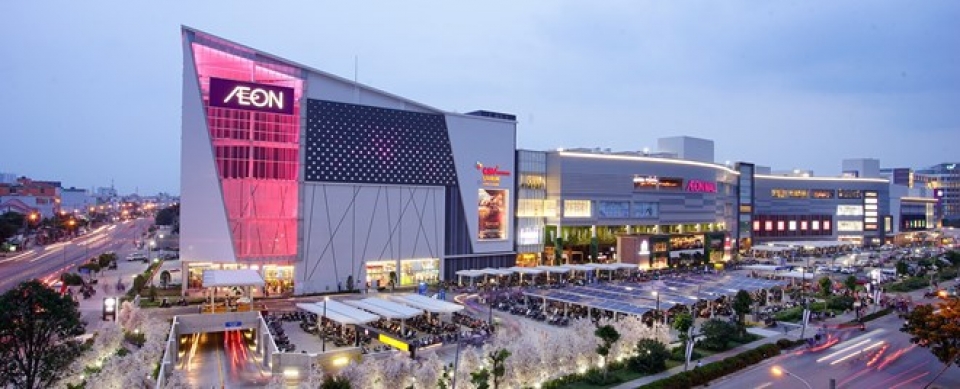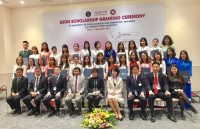
New Japanese investment trend in Vietnam
Latest
| TIN LIÊN QUAN | |
| Second Japanese investment wave to stem from SMEs | |
Masataka Sam Yoshida, Recof’s senior executive for the Vietnamese market said besides retail, non-banking sectors such as finance companies, finance leasing companies and other non-bank credit institutions will be the main investment trend of Japanese firms in the time to come.
 |
| A view of Aeon Mall Binh Tan in Ho Chi Minh City. (Photo: VNA) |
The Japan External Trade Organization (JETRO) also said that Japanese investment in Vietnam was previously directed mainly to the industrial sector, with such big-name manufacturers as Toyota, Honda and Canon, and Mitsubishi. However, more recently Japanese capital has also been flowing into the service and agricultural sectors.
AEON, one of the world’s biggest retailers, for example, began investment in Vietnam in 2013 and currently has six trade centers in the country. Iwamura Yasutsugu, General Director of AEON Mall, said AEON will increase the number of its trade centers in Vietnam to 20 by 2025.
Besides AEON, some of the top names in the Japanese retail industry have so far also joined the Vietnamese market, including 7-Eleven, MiniStop and FamilyMart.
According to industry insiders, the presence of many big names in the Japanese retail industry in Vietnam showed that Japanese investors want to gradually take a dominant market share in the potential outlet.
Meanwhile, Vietnamese consumers prefer Japanese goods thanks to its high quality. Vietnam therefore has become an attractive market for Japanese retailers following the popularity of Japanese goods in the domestic market.
According to Kazuhiro Takahashi, Head of the JETRO’s Food, Agriculture, Forestry and Fishery Division, Vietnam is one of the potential food markets for Japanese enterprises, especially for aquatic products.
Katsuya Uchida, a representative of Japan’s Kyokuyo Company, said that the Vietnamese market currently accounts for 30 percent of the total seafood export turnover of his company. Of which, salmon and tuna are the most consumed products and receive positive feedback from consumers.
In order to dominate the Vietnamese market, Japanese consumer goods and foodstuff enterprises also tend to change some criteria of their products to suit the tastes of Vietnamese consumers besides actively seeking partners who can supply raw materials in Vietnam in order to save costs and lower production costs.
Data from the Ministry of Planning and Investment’s Foreign Investment Agency (FIA) showed that Vietnam has so far attracted 3,599 Japanese direct investment projects totaling US$49.46 billion in registered capital, making it the second biggest foreign investor in Vietnam, after the RoK. In 2017, Japan took the lead among 115 countries and territories investing in Vietnam, with a total registered capital of more than $9 billion, accounting for 25 percent of all foreign direct investment (FDI) capital in the country.
Hironobu Kitagawa, Chief Representative of JETRO Office in Ha Noi, said many Japanese investors are eyeing Vietnam given its impressive economic growth in recent years. In 2017, Vietnam reached an economic growth of 6.81 percent, 0.11 percent higher than the 6.7 percent target set by the National Assembly, and is expected to maintain a high level of economic growth in 2018, as well.
FIA Director Do Nhat Hoang said apart from the impressive growth figures, political stability, open investment promotion policies, a large population, and labor costs considerably lower than those in many other countries have made Vietnam an attractive destination for foreign investors, including Japanese ones.
Hoang said Vietnam is considered one of the most politically stable countries in the world, a vitally important commodity for investors weighing long-term financial commitments in the country.
 | Changing retail landscape and the rise of shopping malls The retail landscape in Vietnam is changing, with the fall of department stores while shopping malls are flourishing. |
 | Vietnamese retail sector to flourish in AEC era Since the establishment of the ASEAN Economic Community (AEC), Vietnam has become a potential market for regional retailers, which promotes the development of the domestic ... |
 | Vietnamese students receive AEON Scholarships The AEON 1% Club Foundation, a member of Japanese retail and financial services corporation AEON, granted 60 scholarships to Vietnamese university students at a ceremony ... |

























